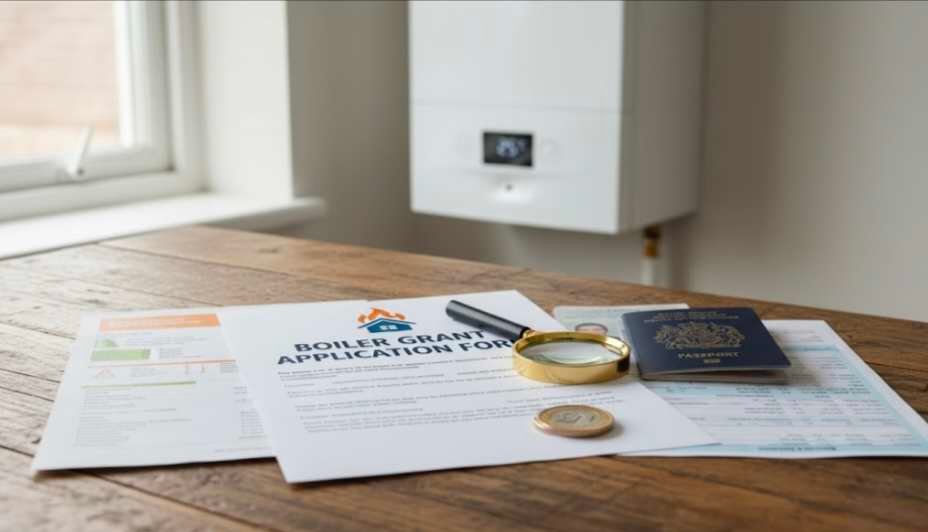Most grant applications fail to materialize because people can’t get their papers in order. Not hard, just sloppy planning. You’re going to put $\text{£}2,000-\text{£}7,000$ worth of free heat upgrade on the table, and you think they’re just going to hand it over to you without paperwork? That’s what actually matters if you’re after ECO4 or BUS grants. No ifs, no jargon, just the forms between you and a Free Boiler Grant.
Why Your Documents Actually Matter
Think grant schemes are a handout of charity? They’re disguised compliance exercises in the guise of subsidies. Every paper you sign attests to three things: that you qualify, that you’re (or control) the property, and that the installer won’t botch the job.
Miss a document? Your application remains in limbo. Send the incorrect version? Rejected. Get your landlord’s signature on the incorrect form? Start over. The cons are not intended to help you; they are intended to protect public funds.
| Document Type | Verifies | Rejection Rate If Missing |
| Property ownership | Legal rights | 89% |
| Valid EPC | Energy inefficiency | 76% |
| Benefits proof | Income eligibility | 82% |
| Installer accreditation | Compliance standards | 100% |
That’s not opinion. That’s processing data from installers who handle 300+ applications yearly.
The Core Documents You Can’t Skip
Every scheme has its quirks, but four categories dominate every grant checklist. Get these right, and you’re 90% approved. Miss one, and you’re reapplying next month.
Property Ownership or Tenancy Rights
Homeowners: Your mortgage statement works. So does a land registry extract or title deed. Pick one, they don’t need three proofs you own bricks and mortar.
Tenants: Tenancy agreement plus landlord consent letter. Both. Not one or the other. Your landlord needs to explicitly state they approve the boiler installation, not just acknowledge you live there.
Why does this matter? Because schemes won’t fund upgrades on properties where the applicant might vanish in three months. Ownership stability = installation accountability.
Energy Performance Certificate (The EPC Nobody Updates)
Your EPC must be valid, that means issued within 10 years, not 11. BUS requires it. ECO4 requires it. Local authority flex schemes? They require it too.
What band do you need? Most schemes target D–G ratings. If you’re sitting at C or above, you’re already “too efficient” for fuel poverty schemes. Ironic, isn’t it?
EPC trap: Your certificate shows the property’s efficiency, not your boiler’s age. A 15-year-old boiler in a well-insulated house might still show Band C. That EPC won’t qualify you, even though your boiler is garbage.
Income, Benefits, or Household Eligibility Proof
This separates targeted schemes from free-for-all rebates. Are you receiving qualifying benefits? Bring the award letter dated within the last 3–6 months.
Qualifying benefits include:
- Universal Credit
- Pension Credit (Guarantee Credit)
- Income-based JSA or ESA
- Child Benefit + income threshold
- Working Tax Credit + income cap
No benefits? Some schemes allow “flex eligibility” if your household income sits below £31,000. You’ll need payslips, bank statements, or tax returns. Recent ones, not from 2022.
Current Heating System Documentation
Schemes want proof that your boiler is inefficient enough to justify replacement. Most require your existing boiler to be 8+ years old or non-condensing (pre-2005 models).
How do you prove boiler age? Serial number lookup, commissioning certificate, or installation invoice. No paperwork? Some installers can verify age during the survey, but don’t bank on it.
Off-grid properties (oil, LPG, electric) have different eligibility rules. If you’re not on mains gas, document your current fuel type clearly.
Installer Documents (Because They Control Half the Process)
Your installer isn’t just fitting a boiler; they’re your grant co-applicant. Their credentials determine whether your application even gets reviewed.
The Quote and Accreditation Proof
You need a formal quote from a certified installer. For gas boilers: Gas Safe registration. For heat pumps or low-carbon systems: MCS (Microgeneration Certification Scheme) accreditation.
Check their credentials yourself. Don’t trust their website badge; verify registration numbers on the official registries. Cowboy installers love logo theft.
The quote must show:
- Property address (matching your ownership docs)
- System specifications
- Total cost and grant deduction breakdown
- Installer company registration number
If the quote doesn’t match the address on your EPC? Application denied. If the installer’s MCS cert expired last month? Application denied. Details matter.
Additional Documents (The “It Depends” Category)
Some applications breeze through with the core four. Others hit edge cases that demand extra proof.
Landlord consent forms aren’t optional if you’re renting, even if your tenancy agreement says you can “make improvements.” Get a signed, dated letter explicitly approving the boiler installation.
Bank details for voucher schemes or payment-at-completion grants. Some schemes pay installers directly; others reimburse you. Know which applies.
Previous installation records, if you’ve upgraded before. BUS particularly scrutinises new-build or recent renovation properties to avoid double-dipping on subsidies.
Self-build invoices for owner-built properties applying under BUS. You’ll need construction contracts showing you funded and managed the build.
Document Prep Strategy (How Not to Fail)
Most rejections aren’t eligibility failures; they’re administrative incompetence. Here’s how you avoid that.
Match everything. Your name on the EPC should match the name on ownership docs, which should match the installer quote, which should match your benefits letter. “J. Smith” on one document and “James Smith” on another? That’s a red flag for fraud checks.
Digital and physical copies. Scan everything at 300 DPI minimum. Keep originals for verification requests. Cloud backup of your scans, lost paperwork costs.
Timeline awareness. EPCs are valid for 10 years, quotes are valid for 30–90 days (installer-dependent), and benefits letters are preferably within 3 months. Expired documents = instant rejection.
Let your installer handle submission if they offer. Experienced grant installers process 50+ applications monthly. They know what passes review. You don’t.
Common Pitfalls (And How They Kill Applications)
| Mistake | Consequence | Fix |
| EPC over 10 years old | Auto-rejection | Order new EPC (£60–£120) |
| Names don’t match across docs | Fraud flag, delayed review | Use exact legal names everywhere |
| Non-MCS installer for BUS | Ineligible application | Switch installers before quoting |
| Missing landlord signature | Application on hold | Get a signed letter with a date |
| Income proof unclear | Manual review delay (4–6 weeks) | Submit clear, recent statements |
Final Thoughts
That’s the document reality. No shortcuts, no excuses. Gather the right paperwork, keep details consistent, and work with certified installers. This applies particularly to applicants for the Boiler Replacement Scheme Over 60s. Do that, and you’ll have a funded boiler within 6–8 weeks.
Miss a document? You’ll be explaining to your family why you’re still burning £200/month on heating bills next winter.



